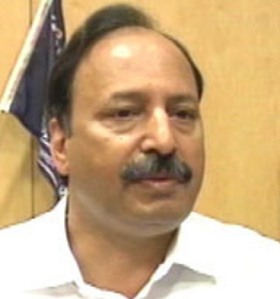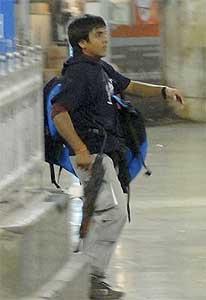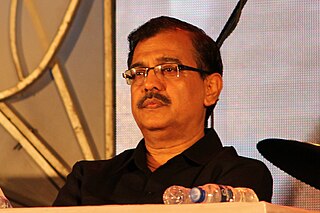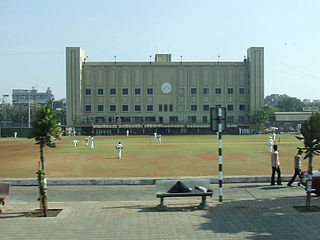
The Parsis or Parsees are a Zoroastrian ethno-religious community in the Indian subcontinent. They are descended from Persians who migrated to the Indian subcontinent during and after the Arab conquest of Iran in the 7th century, when Zoroastrians were persecuted by the early Muslims. Representing the eldest of the Indian subcontinent's two Zoroastrian communities, the Parsi people are culturally, linguistically, and socially distinct from the Iranis, whose Zoroastrian ancestors migrated to British-ruled India from Qajar-era Iran. The word Parsi is derived from the Persian language, and literally translates to Persian.
Matunga is a Suburb in Mumbai, India. It is accessible from the Matunga Road station on the Western line, Matunga station on the Central Line and King's Circle station on the Harbour Line.

Nariman Point is a prominent downtown area of Mumbai in Maharashtra, India. Located on the southern tip of the Mumbai peninsula, at the end of the Mumbai's Marine Drive, Nariman Point houses some of India's prestigious business headquarters.

Marine Drive is a 3 kilometre-long promenade along the Netaji Subhash Chandra Bose Road in Mumbai, India. The road and promenade were constructed by Pallonji Mistry. It is a banana-shaped, six-lane concrete road along the coast of a natural bay. At the northern end of Marine Drive is Girgaon Chowpatty and the adjacent road links Nariman Point at the southern tip to Babulnath and Malabar Hill at the northern tip. Marine Drive is situated on reclaimed land facing west-south-west. Marine Drive is also known as the Queen's Necklace because, when viewed at night from an elevated point anywhere along the drive, the streetlights resemble a string of pearls in a necklace.

The Mumbai cricket team, formerly known as the Bombay Cricket Team, is a cricket team which represents Mumbai in Indian domestic cricket. It is governed by Mumbai Cricket Association. Its home ground is Wankhede Stadium in Churchgate.

The Bombay Gymkhana, established in 1875, is a premier private members' club in the city of Mumbai, India.
The Bombay Tournament was an annual cricket competition held in British India between 1892 and 1946. Until 1936, matches were played on either the Gymkhana Ground in Bombay or the Deccan Gymkhana Ground in Poona, and then at the Brabourne Stadium in Bombay until the tournament was terminated in 1946. The tournament was known variously as the Bombay Presidency Match, Bombay Triangular, Bombay Quadrangular, and Bombay Pentangular, depending on the number of competing teams.
Gymkhana Club is the club or gentleman's club associated with gymkhana, a British-colonial term for sports club; many are called simply Gymkhana in short.
Indigenous tribals have inhabited Mumbai (Bombay) since the Stone Age. The Kolis and Aagri were the earliest known settlers of the islands. Between the 2nd century BCE and 10th century CE, the islands came under the control of successive indigenous dynasties: the Satavahanas, Abhiras, Vakatakas, Kalachuris, Konkan Mauryas, Chalukyas, Rashtrakutas, Silharas & Cholas.

The 2008 Mumbai attacks were a series of coordinated terrorist attacks that took place in November 2008, when 10 members of Lashkar-e-Taiba, carried out 12 shooting and bombing attacks lasting four days across Mumbai. The attacks, which drew widespread global condemnation, began on Wednesday 26 November and lasted until Saturday 29 November 2008. A total of 175 people died, including nine of the attackers, with more than 300 injured.

Hemant Kamlakar Karkare, was the chief of the Mumbai Anti-Terrorism Squad (ATS). He was killed in action during the 2008 Mumbai attacks. In 2009, he was posthumously given the Ashoka Chakra, India's highest peacetime gallantry decoration.

Mohammed Ajmal Amir Kasab was a Pakistani terrorist and a member of the Islamist terrorist organization Lashkar-e-Taiba through which he took part in the 2008 Mumbai terrorist attacks in Maharashtra, India. Kasab, alongside fellow Lashkar-e-Taiba recruit Ismail Khan, killed 72 people during the attacks, most of them at the Chhatrapati Shivaji Terminus. Kasab was the only attacker who was apprehended alive by the police.

Ujjwal Nikam is an Indian special public prosecutor who has worked on prominent murder and terrorism cases. He helped prosecute suspects in the 1993 Bombay bombings, the Gulshan Kumar murder case, the Pramod Mahajan murder case, and the 2008 Mumbai attacks. He was also the special public prosecutor in the 2013 Mumbai gang rape case, 2016 Kopardi rape and murder case. Ujjwal Nikam argued on behalf of the state during the 26/11 Mumbai attack trial.
Abbas Kazmi is a criminal lawyer who received wide media coverage for representing Ajmal Kasab, the prime accused in the 26/11 Mumbai terror attacks. In 2010, he was a contestant in the reality show Bigg Boss 4.

Parmananddas Jivandas Hindu Gymkhana, Primarily, historically known as Hindu Gymkhana is a gymkhana located along Marine Drive in Mumbai. It originally started as Hindu Cricket Club in 1878. The gymkhana itself was inaugurated by then Governor of Bombay, Lord Harris on 5 May 1894. At that time it was located on Marine Lines, which was its only access route as Marine Drive was yet to be reclaimed. Until 1942, membership of the gymkhana was restricted to people of Hindu religion. In 1942, when the government occupied the adjacent premises of the Islam Gymkhana and Parsi Gymkhana in Bombay during World War II, the gymkhana threw its membership open to Parsis and Muslims as an "emergency measure". Hindu Gymkhana was responsible for fielding the Hindu XI in the Bombay Quadrangular and its successor Bombay Pentangular cricket tournaments. The gymkhana is one of the founder members of the Bombay Cricket Association. Hindu Gymkhana organises several tournaments such as Purshottam Shield Cricket Tournament, which is the oldest tournament started in 1912 that it organises.
Parsi Gymkhana is a gymkhana located along Marine Drive in Mumbai. It was built for sports and social activities of Parsis. The gymkhana is one of the founder members of the Bombay Cricket Association The club has its own cricket ground, the Parsi Gymkhana Ground, where Parsis cricket team's matches are organised.

Grant Road is a locality in South Mumbai.
Religion in Maharashtra is characterised by the diversity of religious beliefs and practices.
Parsi Gymkhana Ground is a multipurpose club ground in Mumbai, Maharashtra. The ground is mainly used for organizing matches of football, cricket and other sports.
PJ Hindu Gymkhana Ground is a multi purpose club ground in Marine Drive, Mumbai, Maharashtra. The ground is mainly used for organizing matches of football, cricket and other sports.











